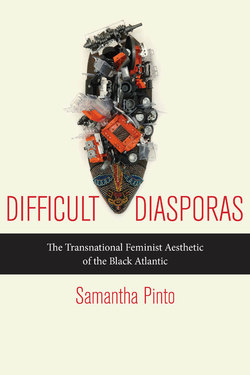Difficult Diasporas

Реклама. ООО «ЛитРес», ИНН: 7719571260.
Оглавление
Samantha Pinto. Difficult Diasporas
About NYU Press
Отрывок из книги
Thank you for buying this ebook, published by NYU Press.
Sign up for our e-newsletters to receive information about forthcoming books, special discounts, and more!
.....
The “tale” goes on to tell of Smith knocking down van Vechten’s white wife after a patronizing request for a good-bye kiss from the blues singer. In another text, and even in the context of Kay’s no-fault portrait of Smith, this episode would seem par for the course—celebrating a blueswoman’s bawdiness, her “difference” from white culture and codes of behavior, her rebellion against even the subtle racial and gendered limits of dominant culture. The portrait of Smith is of the resisting-victim variety—certainly not a new form for black literature. But couched as it is in Kay’s own location as the only black face among a sea of white ones, including her parents, in a nation that is “alien territory” for easily recognizable blackness, this aneċe potentially tells a different story of the locations of blackness. Kay longs for black identifications and familiarity within the confines of her immediate, white-identified space. Her textual persona does not revolt but rather locates a space in her parents’ house, in her best friend’s box bedroom, to experience blackness differently. Smith’s reaction may be an act of displaced desire, but it is also Kay’s suggestion of the limits even of recognizably black and white experience, the limits of a small apartment in a city and time “full of” blackness.
The box bedroom and the grand arc of imaginary diaspora geographies suggested in this section begin to expand the ways we might think of space and location in the frame of the black diaspora. The transurban centers that define Black Atlantic exchange—Harlem, London, Paris, Port-au-Prince, and so on—remain key destinations but are decentered as sources in Kay’s profile and as the most meaningful sites of production.20 But Kay also refuses a retreat to “the local” as characterized by antimodern, romanticized representations of the folk in African American criticism, on the one hand, or the homogeneous indigeneity of the developing world in the case of some transnational feminist constructions. Instead, Bessie Smith asks, “What does a girl from Bishopbriggs near Glasgow know about Chattanooga?” (1997, 17) and assumes a collection of circulating objects of “research,” a popular culture archive, if you will, of songs, an atlas, a biography of Billie Holiday, a bottle of Coca-Cola, that informs that exchange (17–19). Her invocation of sources is, as nonfiction goes, uneven at best; but it is not a thoroughness that Kay is after but an ethereal itinerary, with pins stuck in the places—past, present, and future—that diaspora routes might travel, even unexpectedly.
.....